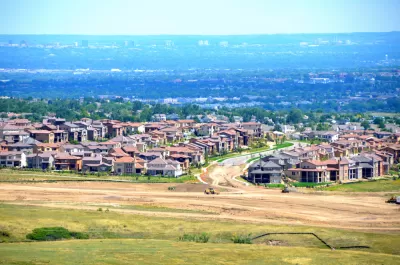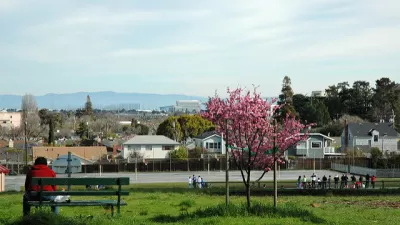In a scathing response to arguments in favor of a "slow growth" ordinance in Lakewood, Colorado, Mike Eliason rebukes the idea that capping growth is a green policy.

The city of Lakewood, Colorado recently made waves by approving strict caps on residential development, a policy some environmental activists supported. "To anyone who has been paying attention to the housing crisis across the country, the outcomes of such an act will be quite obvious," Mike Eliason writes. "Home values will continue to escalate, affordability will not improve, rents will go up, commutes will get longer, homelessness will increase."
In addition to the policy's potential social and economic pitfalls, Eliason says it's preposterous to view "slow growth" measures as environmentally friendly. He writes, "the cap does not apply to business and commercial properties. What this means is that the city can continue to add jobs at a staggering clip, but the housing that should be added to balance those jobs in the city, will be forced to be located outside the city."
Eliason ridicules the idea that "forcing 4,000 more people to drive into the city for work, life, sports, school" can constitute a plan for climate action. "In fact, it is the exact opposite of a climate action plan, and here is why. Lakewood's own 2015 carbon emissions inventory shows that as it has gotten denser, its carbon footprint has actually gotten smaller."
Calling Lakewood's anti-development policies "a form of climate arson," Eliason also points out that they can be racially and economically discriminatory, foisting the burdens of auto-centric sprawl on youth, the poor, and people of color while preserving the benefits for well-off mostly-white homeowners.
FULL STORY: A growth cap is Climate Arson

Study: Maui’s Plan to Convert Vacation Rentals to Long-Term Housing Could Cause Nearly $1 Billion Economic Loss
The plan would reduce visitor accommodation by 25,% resulting in 1,900 jobs lost.

North Texas Transit Leaders Tout Benefits of TOD for Growing Region
At a summit focused on transit-oriented development, policymakers discussed how North Texas’ expanded light rail system can serve as a tool for economic growth.

Using Old Oil and Gas Wells for Green Energy Storage
Penn State researchers have found that repurposing abandoned oil and gas wells for geothermal-assisted compressed-air energy storage can boost efficiency, reduce environmental risks, and support clean energy and job transitions.

Private Donations Propel Early Restoration of Palisades Playground
Los Angeles has secured over $1.3 million in private funding to restore the Pacific Palisades playground months ahead of schedule, creating a modern, accessible space that supports community healing after recent wildfires.

From Blight to Benefit: Early Results From California’s Equitable Cleanup Program
The Equitable Community Revitalization Grant (ECRG) program is reshaping brownfield redevelopment by prioritizing projects in low-income and environmental justice communities, emphasizing equity, transparency, and community benefits.

Planting Relief: Tackling Las Vegas Heat One Tree at a Time
Nevada Plants, a Las Vegas-based nonprofit, is combating the city’s extreme urban heat by giving away trees to residents in underserved neighborhoods, promoting shade, sustainability, and community health.
Urban Design for Planners 1: Software Tools
This six-course series explores essential urban design concepts using open source software and equips planners with the tools they need to participate fully in the urban design process.
Planning for Universal Design
Learn the tools for implementing Universal Design in planning regulations.
Ascent Environmental
Borough of Carlisle
Institute for Housing and Urban Development Studies (IHS)
City of Grandview
Harvard GSD Executive Education
Toledo-Lucas County Plan Commissions
Salt Lake City
NYU Wagner Graduate School of Public Service




























